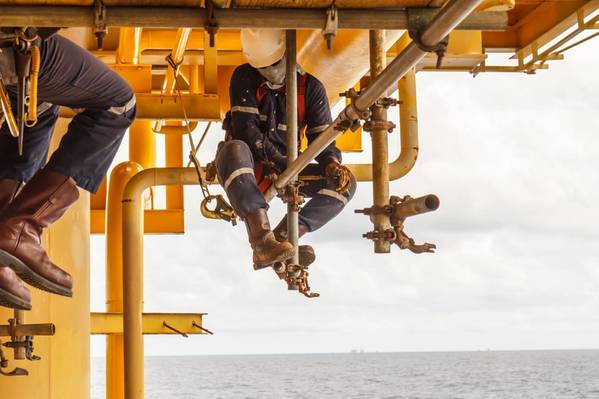
The offshore oil and gas sector urgently needs a comprehensive strategy to ensure that the risks of dropped objects are mitigated effectively prior to and during decommissioning. If mismanaged, drops may result in safety risks for personnel, elevated operational costs, and environmental and reputational damage.
This is according to Dropsafe, who highlights that offshore drops risks may have been exacerbated due to the prolonged periods rigs spend idle at sea or ‘stacked’ prior to decommissioning activity.
The scale of decommissioning work required in key markets such as the North Sea presents both a significant challenge and opportunity for businesses in the offshore sector. There are 600 oil & gas platforms in the North Sea, of which 470 are scheduled to be decommissioned over the next 30 years. 50% of the assets decommissioned up to 2040 in that region will be from the U.K., adding up to over 470,000 metric tons of infrastructure which must be cost-effectively and safely removed.
Humidity, saltwater and adverse weather all cause significant corrosion, which can lead to fixtures and equipment on offshore platforms becoming loose or otherwise compromised. During the labor-intensive dismantling of these platform, the structure is subjected to vibrations, impacts and jolting as the heavy components are taken apart.
Personnel and equipment on site are therefore exposed to an increased risk of drops incidents – in the form of both ‘dynamic’ Drops such as tools and equipment, and ‘static’ drops such as light fittings.
Dropsafe has identified five key risk areas that decommissioning contractors must target to tackle drops effectively.
The increased number of cranes and heavy lifting equipment used on site means that personnel are exposed to greater drops risk. This must be tackled by thorough planning and safety training.
Many platforms awaiting decommissioning sit idle for extended periods of time with minimal maintenance – sometimes for a number of years. Deterioration of connectors and support structures multiplies the drops risk considerably. Use of robust prevention systems such as the Dropsafe Net is essential to mitigate resulting ‘static’ drops.
Asset owners that take a ‘quick fix’ approach to drops mitigation with the adoption of low-cost, short-term prevention systems may expose themselves to long-term repair and replacement costs, particularly if a decision is made to postpone decommissioning activity. To mitigate this financial risk, solutions should be adopted that are guaranteed to last for an extended period under warranty.
Amid high levels of scrutiny on environmentally-sound decommissioning, drops threaten company reputation and potential legal consequences. Offshore assets often shelter delicate marine ecosystems, which harbour rare species of fish, plant and bird. Preventing broken pieces of the structure or equipment from dropping into the sea and causing environmental damage is essential to mitigating long-term damage to industry standing.
Decommissioning can involve multiple personnel working at height. It is imperative that all members of decommissioning teams are equipped with appropriate drops prevention products. For example, the Dropsafe Pouch is designed to secure tools and other small items while personnel work.
Mike Rice, Managing Director of Dropsafe, said, “The benefits of robust drops prevention are clear. The decommissioning industry has worked hard to improve its reputation, but decades of progress could be lost if companies are seen to be unsafe employers and unresponsive to environmental concerns.”
“Continuing proactive and thorough drops prevention throughout the entire lifetime of the rig, from construction to cold stacking to decommissioning, makes financial sense. The efficiency benefits to be gained from this are significant, because a full range of Dropped Object prevention solutions can be installed together – meaning reduced logistical costs.”



